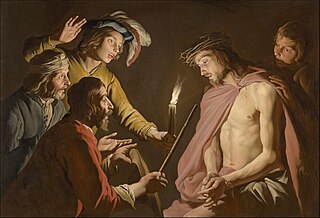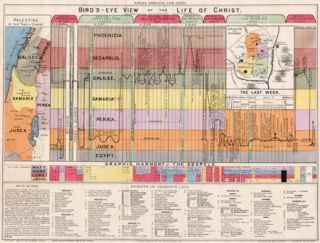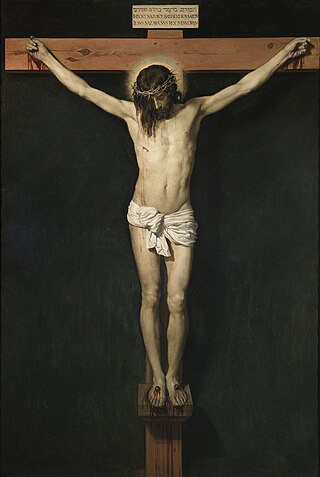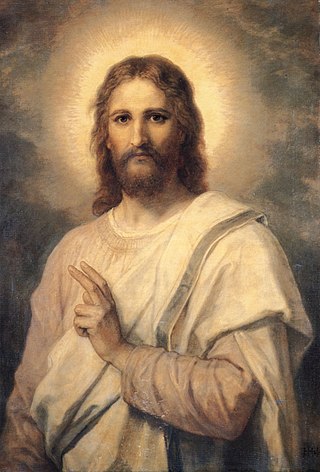
Baptism is a Christian sacrament of initiation almost invariably with the use of water. It may be performed by sprinkling or pouring water on the head, or by immersing in water either partially or completely, traditionally three times, once for each person of the Trinity. The synoptic gospels recount that John the Baptist baptised Jesus. Baptism is considered a sacrament in most churches, and as an ordinance in others. Baptism according to the Trinitarian formula, which is done in most mainstream Christian denominations, is seen as being a basis for Christian ecumenism, the concept of unity amongst Christians. Baptism is also called christening, although some reserve the word "christening" for the baptism of infants. In certain Christian denominations, such as the Catholic Churches, Eastern Orthodox Churches, Oriental Orthodox Churches, Assyrian Church of the East, and Lutheran Churches, baptism is the door to church membership, with candidates taking baptismal vows. It has also given its name to the Baptist churches and denominations.

The Eucharist, also known as Holy Communion, Blessed Sacrament and the Lord's Supper, is a Christian rite that is considered a sacrament in most churches, and as an ordinance in others. Christians believe that the rite was instituted by Jesus at the Last Supper, the night before his crucifixion, giving his disciples bread and wine. Passages in the New Testament state that he commanded them to "do this in memory of me" while referring to the bread as "my body" and the cup of wine as "the blood of my covenant, which is poured out for many". According to the Synoptic Gospels this was at a Passover meal.

The Second Coming is the Christian belief that Jesus Christ will return to Earth after his ascension to Heaven. The idea is based on messianic prophecies and is part of most Christian eschatologies. Other faiths have various interpretations of it.

The Great Apostasy is a concept within Christianity to describe a perception that mainstream Christian Churches have fallen away from the original faith founded by Jesus and promulgated through his Twelve Apostles.

The Passion is the short final period before the death of Jesus, described in the four canonical gospels. It is commemorated in Christianity every year during Holy Week.
Many Wikipedia articles on religious topics are not yet listed on this page. If you cannot find the topic you are interested in on this page, it still may already exist; you can try to find it using the "Search" box. If you find that it exists, you can edit this page to add a link to it.

The nativity of Jesus, nativity of Christ, birth of Jesus or birth of Christ is documented in the biblical gospels of Luke and Matthew. The two accounts agree that Jesus was born in Bethlehem, Judaea, that his mother, Mary, was engaged to a man named Joseph, who was descended from King David and was not his biological father, and that his birth was caused by divine intervention. Most scholars do not see the two canonical gospel nativity stories as historically factual since they present clashing accounts and irreconcilable genealogies. The secular history of the time does not synchronize with the narratives of the birth and early childhood of Jesus in the two gospels. Some view the question of historicity as secondary, given that gospels were primarily written as theological documents rather than chronological timelines.

In Christianity, Jesus is believed to be the Son of God as written in the Bible's New Testament, and in mainstream Christian denominations he is God the Son, a person of the Trinity of God.
The following outline is provided as an overview of and topical guide to Christian theology:

A chronology of Jesus aims to establish a timeline for the events of the life of Jesus. Scholars have correlated Jewish and Greco-Roman documents and astronomical calendars with the New Testament accounts to estimate dates for the major events in Jesus's life.

The life of Jesus is primarily outlined in the four canonical gospels, which includes his genealogy and nativity, public ministry, passion, prophecy, resurrection and ascension. Other parts of the New Testament – such as the [[ other, and which include references to key episodes in the life of Jesus, such as the Last Supper, and the Acts of the Apostles, which includes more references to the Ascension episode than the canonical gospels also expound upon the life of Jesus. In addition to these biblical texts, there are extra-biblical texts that Christians believe make reference to certain events in the life of Jesus, such as Josephus on Jesus and Tacitus on Christ.

Eucharistic theology is a branch of Christian theology which treats doctrines concerning the Holy Eucharist, also commonly known as the Lord's Supper and Holy Communion. It exists exclusively in Christianity, as others generally do not contain a Eucharistic ceremony.
Criticism of the Seventh-day Adventist Church includes observations made about its teachings, structure, and practices or theological disagreements from various individuals and groups.
This is a glossary of terms used in Christianity.
Jewish deicide is the notion that the Jews as a people are collectively responsible for the killing of Jesus, even through the successive generations following his death. A Biblical justification for the charge of Jewish deicide is derived from Matthew 27:24–25. Some rabbinical authorities, such as 12th-century scholar Maimonides and, more recently, ultranationalist Israeli rabbi, Zvi Yehuda Kook (1891–1982), have asserted that Jesus was indeed stoned and hanged after being sentenced to death in a rabbinical court.

The crucifixion of Jesus was the execution by crucifixion of Jesus of Nazareth in 1st-century Judaea, most likely in AD 30 or AD 33. It is described in the four canonical gospels, referred to in the New Testament epistles, attested to by other ancient sources, and is broadly accepted as one of the events most likely to have occurred during his life. There is no consensus among historians on the details.

The following outline is provided as an overview of and topical guide to Christianity:

The following outline is provided as an overview of and topical guide to Wikipedia articles on the life and influence of Jesus.
Articles related to Christianity include:










